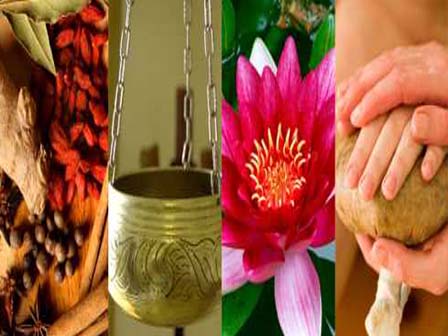
The most ancient science in healthcare “Ayurveda” & the oldest holistic system of medicine in the world that not only deals with the diseased persons but also take care of healthy person. It is the art of healthy living that has been helping human beings to create esteem in daily life by self-knowledge and self care. The word Ayurveda is derived from the ancient Indian language Sanskrit where ‘ayus’ means life and ‘veda’ means knowledge or science. So, the literal meaning of the word Ayurveda is knowledge or science of life.
This traditional system of healing is based on the theory of balancing the body, the soul and the mind. This balancing includes eating the right thing at the right time, adapting to daily lifestyle habits, daily mediation and maintaining purity of mind and soul. There is a strong connection between the mind and the body. It not only controls the process of thoughts but also helps the body in day-to-day activities such as respiration, blood circulation, digestion and elimination. Our physiology is regulated by the combined work of mind and body. The senses are used as information gatherers so that the mind can act accordingly to the body. The clarity of senses helps the mind and body to integrate their functions so that the human beings can live a healthy and happier life. Before existing in the physical body we exist in a more fine and delicate form known as the soul.
Two main goals & Mission of Ayurveda :
To maintain the health of the healthy
To heal the sick
These goals can be achieved by adopting the right diet, daily regimen, lifestyle, actions and activities. Various problems like depression, anxiety, nervousness, and insomnia are due to sick mind and body. Therefore, a balance is needed in the functioning of both mind and body for good health.
Ayurveda recognizes three main energies that combine to form all the five elements in the universe. These basic energies are vitta, pitta and kapha. These energies are seen in the processes of growth, maintenance and decay. Their actions are named anabolism, metabolism and catabolism.
Pitta is composed of fire and water. Kapha comprises water and earth. Vatta is composed of air and space.
There are four other elements that Ayurveda considers :
Dhatus – maintains and nourishes the body.
Mala – waste products due to the metabolic process of the body.
Srota – transports the food.
Agni – responsible for various metabolic activities.
This branch of ayurveda highlighted that celibacy is essential for good health. It helps increase the will power, intellect and memory in addition to a healthy body. The shukra dhatu has a direct link with ojas or the immunity of the body. Hence, vajikaran prescribed the therapeutic use of various aphrodisiacs and tonic preparations for enhancing the vigor and reproductive capabilities of men that also strengthens other body tissues (dhatus) like muscles, fats, bones and blood. Vajikarana is mainly concerned with therapies concerning specific remedies for male infertility and impotence as well as female infertility. They serve as good aphrodisiacs and induce an immediate sense of pleasurable excitement, along with increased fertile seminal secretions even in an ageing person.
